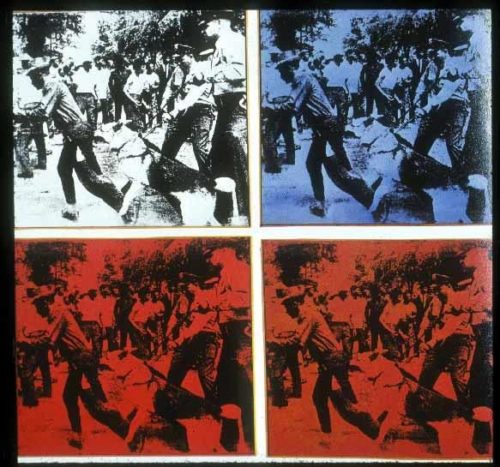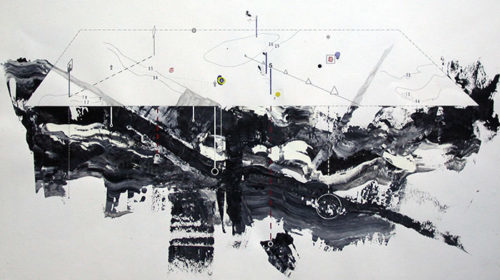
Andy Warhol
“Because there has not yet been any progress in the world, there is progress in art; ‘il faut continuer’ [it must continue].”
Theodor Adorno (Aesthetic Theory)
“Deadly monotony and indeed a total absence of content thus characterise the reign of the commodity. Gradually, an abstract, empty and unchanging form, a pure quantity without quality—money—is imposed on the world’s infinite and concrete diversity. The commodity and money are indifferent to the world, which for them is nothing more than raw material to be used. The very existence of a concrete world, with its laws and its opposition, is ultimately an obstacle to the accumulation of capital, which has no other goal than itself. In order to change each sum of money into a larger one, capitalism is consuming the whole world (on all levels, social, environmental, aesthetic and ethical). Behind the commodity and its fetishism a veritable “death drive” is hidden, an unconscious but powerful tendency towards the “annihilation of the world.”
Anselm Jappe (The Writing on the Wall)
“Dracula, written in the same year that saw Freud begin his self-analysis, is a refined attempt by the nineteenth-century mind not to recognize itself.”
Franco Moretti (Dialectic of Fear)
One of the topics I touched on in both the roundtable podcast I did while in L.A. (https://soundcloud.com/aestheticresistance)
and in my last blog post is the disappearance of the familiar social structures that framed art and cultural undertakings. Anselm Jappe, in a very good book (The Writing on the Wall) suggests that the psychic corollary to commodity fetishism is narcissism. In the strict psychoanalytic meaning of that term the narcissist sees the world as an expression of himself. And in this sense the contemporary west is, indeed, acutely narcissistic.

Madhavan Palanisamy
“Every external object is experienced by the narcissist as a projection of his own self. In contrast, this self remains extremely deficient due to its inability to be enriched by real relationships with external objects.”
Anselm Jappe (The Writing on the Wall)
“But in addition to registering the positive emotional implications of the mirror stage, Merleau-Ponty followed Lacan, as he read him, in discerning negative ones as well. “Thereupon I leave the reality of my lived me in order to refer myself constantly to the ideal, fictitious, or imaginary me, of which the specular image is the first outline. In this sense I am torn from myself, and the image in the mirror prepares me for another still more serious alienation, which will be the alienation by others. For others have only an exterior image of me, which is analogous to the one seen in the mirror.” One result is the conflict between the internal and external senses of the self, which leads to aggressive feelings as well as narcissistic jubilation. “
Martin Jay (Eyes Downcast)
One way to discuss the difficulty of creating cultural work today is to recognize that never before (and Jappe notes this) has there been more “art” and never before has it been of so little importance.
“To push people into being a bit nicer and friendlier in their everyday lives, as “relational art” tries to do, is to degrade art into a therapy against the coldness of the world. If it wants to break the hardness of fetishistic and narcissistic individuals, art itself has to be hard and difficult. This requires it to be demanding, not deliberately abstruse. If art wants no truck with the world as it is, it must stop pandering to “people”, stop making their lives easier, making society nicer, more useful, stop delighting.”
Anselm Jappe (ibid).

Heinz Mack with his Stele in the Desert (Tunesia, 1968)
I have very often felt that people ‘make’ too much artwork. Of course I exclude myself. I don’t make enough (cue laugh track). That’s part of the obvious dilemma. But what I think I mean (because in one sense I believe I am right) is that too much is created in wrong contexts. There is a need for a kind of refusal in the artist. A witholding.
This has to do, partly anyway, with the rise of the attention economy (sic).
“…critical studies in the field of communications have highlighted the fact that in post-industrial societies, paying attention becomes a new form of labour. Sut Jhally and Bill Livant (1986), for example, suggest that media networks make a profit from capturing the audience’s attention and then selling it to advertising agencies. From their perspective, the audience appears as an active agent in the production of surplus value and human attention can thus be conceived as productive labour. Similarly, Jonathan Beller (2006) contends that with the massification of the Internet, the attention of users becomes a new territory of capitalist exploitation, which alienates the spectator from his or her own vision. ”
Claudio Celis Bueno (The Attention Economy)
Bueno points out that “the abundance of knowledge and information that characterizes knowledge-based economies ‘creates a poverty of attention, and a need to allocate the attention efficiently among the overabundance of information sources that might consume it’ ” This poverty of attention is related to this notion of (desired) witholding in the artist. And it raises the issue of something Beller touches on with his notion of the sensualization of alienation. Beller also notes that with the injunction to communicate there is the opposing reality of words losing their meaning, of words unable to accomplish what we imagine they should. For the narcissist society this is perhaps not experienced as such a bad thing. There has been (per Beller and Descartes) a demotion of discourse. This has been going on for 200 years but has accelerated dramatically over the last sixty years or so.

Luc Tuymans
“…we might consider that the substitution of Quantity for Quality (the reconfiguration of quality by quantity), which has been occurring at least since capital’s beginnings, informed the first as well as this, our computer-mediated penultimate digital culture. (Optimism of the will requires that we do not consider our current digital the ultimate culture but only a precursor: as Christian Fuchs would have it, the emergence of the digital computer is a necessary precondition to the long-sought arrival of communism.) Nonetheless, we should, and indeed must, wager that the current digitization of cultural form finds its conditions of possibility not in what we most easily recognize as the computer but in the dynamics of an older machine language: that of use value/ exchange value imposed by wage labor and the commodity form—which is to say, by capitalism itself. Price was already a snapshot, and a digital one at that.”
Jonathan Beller (Digitality and the Media of Dispossession)
Now Beller lists, as mediatic shifts…extra economic if I am reading him correctly….the following (incomplete)…”the crisis of representation, the rise of visuality and informatics”. What I wonder is if the crisis of representation, if we speak in terms of art, and maybe most in terms of theatre, is not something that been going on, slowly for a long while, since the cave paintings. There is also something to be asked regards the rise of visuality. For the counter argument was put forward by Martin Jay a while back (Downcast Eyes,The Denigration of Visuality in 20th Century French Thought). I suspect both are correct. There is a loss of looking deeply at things but probably a kind of surplus non attentive scanning going on.

Chuck Close
Visuality in the Renaissance moved toward (generally) a versimilitude in objectivity. They sought to duplicate what the saw. Crary notes this and its relationship to photography. This was and is a search for something that did or achieved what the eye did. The flip interpretation (per Crary) is to see the continuum from camera obscura until today (cinema et al) as “single enduring apparatus of power, elaborated over several centuries, that continues to define and regulate the status of an observer.” I think that, again, that apparatus of power, or more precisely, domination, does not preclude the variables and backtracks in the search for *natural vision*.

Photographer unknown, Minneapolis 1944.
“If we want to be historical about it, we must recognize how for nearly two hundred years, from the late 1500s to the end of the 1700s, the structural and optical principles o f the camera obscura coalesced into a dominant paradigm through which was described the status and possibilities of an observer.”
Jonathan Crary (ibid)
Now Crary notes that for hundreds of years there was a development of techniques of power (Kepler, Leibniz’s critique of Locke, Descartes {who seems to be cropping up everywhere suddenly} ) and these epistemological discourses served to establish the criteria for “truth” in western society (why Confucius remains so significant for me…butI digress). And the “truth” *looked* a certain way. And, it would seem to me, that if the truth looked a certain way then it felt a certain way — the uniformity of a coerced point of view, socially speaking, was interrupted (per Crary) early in the 19th century.
I’m not sure I agree with this dateline, but let me follow the argument before returning to Beller. What was being created, and this didn’t change, was a metaphysic of interiority. Rorty (quoted by Crary) saw, in fact, Descartes and Locke as the inventors of western interority. I would say…ok….sort of.

Julio Le Parc
“Finally to wind up this extremely compressed outline, it should also be suggested how closely the camera obscura is bound up with a metaphysic of interiority. It is a figure for the observer who is nominally a free sovereign individual but who is also a privatized isolated subject enclosed in a quasi-domestic space separated from a public exterior world.”
Crary (ibid)
The key word there is privatized. Inner space was taking on its own metaphysic as property. The western vision, ostensively so concerned with visual reliability and chasteness was reflecting the forces of exchange value and — in a sense — reification.
Franco Moretti, of course, as I have noted before, saw the end of the 19th century as profoundly transformative. And it came via discoveries in optics. Microscopes and instruments of magnification were important and led to everything from the Freudian unconscious to detective fiction. This is relevant for the next wave of transformation which I suspect few would argue is the digital age of internet and cyber space. Part of the issue is how property and classical Capitalist models of reasoning and imaging have been affected, and how they in turn (perhaps more significantly) shaped our experience of the digital universe. And, long before this wave of transformations but intensified under it, came questions of reliability. And in turn, a renewed interrogation of the *truth*.
For Beller the appropriation of language (and I would say culture and art, of creativity) by quantity over quality, or quantifications impact on ideas of quality, and the surplus value (and surplus unconscious?) created –developed, by capitalism (and how alienation began to figure in the way people spoke and more, how they *saw*) is crucial to understanding the dead space of mind under late capitalism.

Penelope Haralambidou
“Goldhaber’s novel approach, however, seeks to displace Simon’s conceptualization of attention economy to a specific object of focus: the Internet. He argues that the Internet is not only abundant but overflowing with information. At the same time, he states, ‘there is something else that moves through the Net, flowing in the opposite direction from information, namely attention’ ”
Claudio Celis Bueno (ibid)
This image of overflowing is itself, of course, one that comes out of the system of visuality under discussion.
“Cinema, advertising, and banner ads clearly function in a network of politic-economic relation that convert affect to monetary units and are machines for the mining of attention, but these later forms are the key to the anatomy of their precursors: painting and photography, which must also be grasped as techniques of capture and strategies of control. Taken as whole, we could say that what was once, for the artist at least, only a more or less embarrassing presupposition and but one dimension of visual-cultural production has become the overriding component.”
Jonathan Beller (ibid)
I will take some issue with the above paragraph because I think the anatomy (as he put it) of painting and photography…and lets leave out photography for a moment, are not techniques of capture in the same way as click bait ads are today. Or cinema for that matter. Structurally they bear a resemblance, but Giotto was not doing what Marriage Story is doing. Neither is Goya or Pollock or Bernini. Nor was control inherent in their practice — but perhaps I am not reading Beller right here.
Beller quotes Flusser here…” Since Descartes at least (perhaps since Nocholas of Cusa) scientific discourse has tended towards the re-encoding of thought into numbers, but only since the camera has this tendency become materially possible.” Vilem Flusser (Toward a Philosophy of Photography)

Giotto (Kiss of Judas, 1304) detail.
This is another version of Horkeimer’s instrumental reason. Now without getting too far into Flusser’s theories, the one worth considering is that he sees writing, pictograms in ancient socities, as abstractions of the image. Its metacode. Except that those cave paintings I keep returning to were perhaps already a kind of alphabet or at least a precursor to a grammar of speech. I am just taking a kind of devil’s advocate position regards Flusser. Perhaps its that I think there are steps missing in this timeline. And also, that I think exchange — the structure of capitalism — did even more than the invention of linear writing to disrupt visuality and thinking.
Also, artworks release, they do not control. Advertising controls. World Bank spread sheets control, they make into numerical signs the actions of an economic system of domination and exploitation. And soon vice versa. Giotto’s greatest painting (in my opinion) is Kiss of Judas. In that painting, which directs the eye to the center of the canvas where Judas embraces Jesus … and in that area brushstrokes seem to disappear, the icy reflective golden paint of the halo, the emotional paralysis, the stillness amid chaos. The sense of a mob, the torches and the violently dark sky — this surrounds the quiet violence of betrayal at the center. Now, one might suggest Giotto was capturing on behalf of the Church, and he was paid by a well known banker, but the work is about sacrifice and the sublime, as much as about self betrayal and self loathing, about a transcendent moment of forgiveness — hence, it is Dionysian and about finally Giotto’s own sense of fractured piety… the opposite of what one finds searching social media or watching TV. If one chooses to see the engagement with the artwork as capture then we need to redefine capture, I think.
“We began with the problem of discourse in the context of the digital and have arrived at a universal tendency toward digitization that precedes the so-called digital age by at least five centuries. Cartesian mathematics, Newtonian calculus, the rise of capitalism, and the infusion of digital programming into apparatuses of representation all testify to a environment of discursive practice that has been transformed over several centuries. We also see the relative inability of our language-based strategies of meaning making to account for this digital (which is to say, metaphysical) transformation.”
Jonathan Beller (ibid)

Kurokawa desert House, Libya. 1970 (Cambridge Design Research Studio).
And this is the germane truth of this; wherever one starts, certainly the forces that brought capitalism into prominence and then capital itself, have intensified all the negatives associated with this system of control. And system of alienation. To the point where alienation itself is sold, sensualized, and fetishized. It is also commodified in images and narratives. Now perhaps Beller’s most important point (and one he expanded on in his most recent book) is that the very positing of the human, in western history, is de-facto racist and expressive of a deep indelible othering. There is a macro version of Lacanian psychic development at work in Beller’s vision; the misidentification of the other/self is in service of colonial racist violent exclusionary logics. This is the place where optical technology intersects with capital. And there seems to me two tracks of evolution vis a vis technologies of reproduction and optics. One is what Beller is drawing attention to, and one is what Moretti is describing.
“The payoff is in watching the air go out of the bag. Thus, from the Nietzschean nihilism of “Man would rather will nothingness than will nothing at all” to the Benjaminian diagnosis of the aesthetics of fascism, one begins to understand the compensatory pleasures offered an enfranchised if still exploited citizenry: Debord’s “gilded poverty” lived in exchange for new forms of marginalization and nonexistence. These relations are distributed
through the encroachment of a new sociologistical media paradigm, reiterated at the level of philosophy and savored by theory. One could follow this thread through the contemporary rise of farce, blank irony, simulation, and reality TV, but that would lead us too far afield. The point here is that the demotion of language and the liquidation of the Real is orchestrated in direct relation to the intensive development of the first digital medium
of representation.”
Jonathan Beller (ibid)

Susan Hiller
I think there are complexities to the ways language was usurped, or narrative, really. The erosion of meaning in language meant that narrative became barely something that could be called by that name. And narrative remains profoundly important in struggles against these forces. Part of the point of doing these podcasts is to create a discourse of aesthetic resistance. To create a grammar and even forms of narrative. And eventually to create theatre.
In conclusion Beller writes…” The year 1895—roughly the advent of cinema, psychoanalysis, and structuralism—provides a convenient date to mark both this breakdown of language and its strategies to accommodate its newly precipitated dysfunction. Language ruptures to find images—images to which it can only affix more of itself.”
“Count Dracula is an aristocrat only in a manner of speaking. Jonathan Harker — the London estate agent who stays in his castle and whose diary opens Stoker’s novel — observes with astonishment that Dracula lacks precisely what makes a man ‘noble’: servants.”
Franco Moretti (The Dialectic of Fear, New Left Review 1982)

Tower of Torgrul, Rey, Northern Iran. 11 th century.
Moretti’s rightly famous essay is a useful companion read to Beller (and Jappe). Allow me a couple more quotes from Moretti…
“In Dracula there is monopoly capital and the fear of the mother: but these meanings are subordinated to the literal presence of the murderous count. They can be expressed only if they are hidden (or at least trans-formed) by his black cloak. Only in this way can the social consciousness admit its own fears without laying itself open to stigma. Marxism and psychoanalysis thus converge in defining the function of this literature: to take up within itself determinate fears in order to present them in a form different from their real one: to transform them into other fears, so that readers do not have to face up to what might really frighten them.”
and
“This is the literature of dialectical relations, in which the opposites, instead of separating and entering into conflict, exist in function of one another, reinforce one other. Such, for Marx, is the relation between capital and wage labour. Such, for Freud, is the relation between super-ego and unconscious. Such, for Stendhal, is the bond between the lover and the ‘illness’ he calls ‘love’. Such is the relationship that binds Frankenstein to the monster and Lucy to Dracula. Such, finally, is the bond between the reader and the literature of terror. The more a work frightens, one the more it edifies. The more it humiliates, the more it uplifts. The more it hides, the more it gives the illusion of revealing. It is a fear one needs: the price one pays for coming contentedly to terms with a social body based on irrationality and menace. Who says it is escapist?”
The black cloak — which reminds me of Ted Hughes lengthy analysis of Shakespeare where he links the dark cloak of Richard and the storm in The Tempest, the incessant darkness at the margins of consciousness, and by extension society. Beller suggests that the penetration of visual technologies is close to an unconscious of the unconscious. A repressed media history that ruptured our conventional (coerced) ideas of nature. He writes “Poststructuralism and deconstruction, despite the latter’s intensive emphasis on textuality, amounted to an elaboration of Lacanian aphanasis (the fading of the subject) by placing presence and being itself under erasure. Both the subject and existence could no longer be guaranteed by writing or speech, which, in being understood as moments of a specific technological formation, had become one and the same. One could say that in a visual-becoming-infomatic digital culture, the traditional forms of writing and its subjects were driven to the brink of extinction.”

Brenda Goodman
For Beller, the logical conclusion is that sign function discourse ends with the inevitable realization that our thought is literally the thought of capital. A final quote from Beller…
“…the geopolitical emergence and role of photography during the violent racialization processes of slavery and colonialism tells us not simply about the visual sculpting of racial formations but about the coevolution of two ostensibly separate technologies for graphing people(s) by their external appearances. Which is to say that, as surely as the camera and the photograph have had a role in the transmission and productive (for capital) development of the various racisms, intrinsic to the camera and the photograph is the history of racial exploitation.”
So, to return to the idea of creating theatre (or art at all) means that it is not enough to simply ‘express’ oneself. Art came to be separated from *meaningful* society (the economy) and designated as useless. Adorno of course said the radical aspect of art was found exactly in its uselessness. Jappe notes that “However, culture paid a high price for its freedom: its marginalisation, its reduction to a “game” which, because it did not participate in the cycle of labour and capital accumulation, always remains in a position subordinate to the economic sphere and those who govern it. ” (ibid)

Heiner Thiel
A certain reintegration of the avant garde took place via fashion and the production of cultural goods and eventually advertising and marketing. Capital never leaves anything outside its sphere of influence.
“Indeed, whoever accepts the principle of capitalist competition will soon see themselves also forced to accept all of its consequences.”
Anselm Jappe (ibid)
Thus the idea of witholding. This is not meant to suggest one stop making art, but that one consider the ways in which the hidden valves of capital, that secret media history, the unconscious of the unconscious as it were, is actually the hand holding the pen (or brush, or making the strokes on the keyboard). We are being written as much as writing. The ancient Vedic notion of the dream dreaming us returns again.

Xing Danwen, photography, media.
Jappe notes too that it was Zbigniew Brzezinski, after the World Forum of 1995, who suggested *tittytainment* for the masses, globally, who would likely no longer be needed for production. As Jappe writes..“In other words, the central role traditionally carried out by the repressive clampdown, in order to pre-empt social unrest, is now amply served by infantilisation.”
The Beatles were knighted after all. Art is only art if and when it is not a commodity. This is hardly a recipe for poverty, because that is a very wrong headed idea indeed, but rather a prescription for keeping the work (art) separated from the process of desymbolization and infantilization. As Jappe adds, no society in history has ever created such a mass regression in its populace.
The Beatles and most pop music was never not a commodity, it should be noted. But then the infantile now permeates all aspects of experience. Fast food is infantile, based on (as Jappe pointedly notes) the elimination of acquired tastes. And art is much like learning to appreciate goat cheese, I suppose (sort of, maybe). Notions such as diversity have been highjacked (they hardly needed to be, honestly) the better to impose rote notions of simplified qualities of discernment. As diversity now functions it is, in fact, a system for solidifying class demarcations and one (with the emphasis on superficial definitions of identity) meant to mystify or make invisible class inequality.

Hou Bo, photography.
Identity is a reflexive template that allows for a further erasing of meaning in words. Its a bit like “affordable housing” where there is nothing affordable about it. Or “money advice” in newspapers on news programs where you are advised to save money you don’t have. The manner in which the vocabulary of bureaucratic liberalism is used the same way a hammer is used. People are hammered into mental submission. Where we are today there is virtually no definition for any of the special grammar of sociological planning.
The narcissist is a child, remember. Stuck in an early stage of development. And Lacan is right when he speaks of the fading of the subject. It has all but entirely faded now, replaced with the technologies of barbarism, of exclusion and hierarchy. Artists must survive, and so the choices for poaching what one can, where one can, remain a deadly trap. I ask for donations on this blog. For years I didn’t. But eventually one weighs the plus of keeping an active resistance alive against the pointless pride of passive precarity. That said, I refuse to allow advertising on this site. Its not more than I can’t bear the ugliness.
Good work exists, and is being made. But the flip side of this entire discussion is that of reception. Museums are increasingly integrated into the assaults of the everyday. There is no special ceremonial or ritual sense left when standing before that Rubens or Li Cheng. One of the clearest default settings for contemporary Capitalism is the erasure of history, and alongside that the eradication of any meaningful rituals or communal ceremonies — the better to replace them with kitsch versions. Its the Disneyfication of both the material world and of the mind. Creating and educating for the reception of that which is undomesticated, as it were, is the point of this blog I suppose and of upcoming podcasts. Following upon the disinfecting of this kitsch sensibility and training will come a radical politics I am nearly certain. How can it not?
SO yes, please donate to this blog. The paypal button is up on top. Its in Norwegian but its laid out identically to the English versions you are all, I’m sure, so familiar with.

Arise, Sir Ringo…

Great. So much to discuss . But your quoted author here: “Sut Jhally and Bill Livant (1986), for example, suggest that media networks make a profit from capturing the audience’s attention and then selling it to advertising agencies.” Is this like Martian? For an audience of toddlers and time travellers?They ‘suggest’ this? In 1980s? Like it’s a discovery? It’s insane. When I encounter these academic writers who say they “have a theory” that Commercial broadcasters sell audience to advertisers as a commodity, I feel like these people are a psych experiment. Commercial broadcasters/ Networks sell eyeballs in bundles of 1000. This is why the rate is CPM (cost per mille) . What else do these “theorists” imagine these businesses do? There is nothing mysterious about this. it is the businesss plan of all entertainment media except subscription only, time out of mind. What kind of worldview what kind of rhetorical game is this?
I wanted to say something about the implied technological determinism of the explanation about the Renaissance: the Andalusian and north African and levantine Arab and Berber societies figured this out about the vision…that we, our minds and souls as imagined, our cognitive faculties, are not perceiving the outside directly visually but percieving an image in our eyes or head, mediated, envisioned a camera obscura (tho the retina was only belatedly identified as the screen) and took a different road in the social relations of production. (Rapidly accelerated commercialization and merchant capital without capitalist production per we i.e. the commodification of labor and the classic imperatives)
So Crary on observer is very interesting: isn’t it determined by other realtiobs that observer is —> toward proprietor, (racialization advancing this enormously) much in contrast to the scientific developments in optics in the Southern Mediterranean. (I’ve been thinking a lot about this because of Las Meninas, a treatise of optics and art and humanity and society which emerges at a crossroads of Arab – both Muslim and Jewish – thought and racialized Christian Imperialism )
[without capitalist production per *se]
It’s funny tho these theorists who don’t know what is being measured by “ratings” , and want to convince you Nielsen doesn’t either, are a good example of the purely psychological product they’re searching for and investigating in the guise of sociology, anthropology and mediology (they perceive the human involvement in entertainment media as solely confined to the audience/consumers when the majority are outside this group ). It’s significant the spooky powers intervened to lock up and fascist media avoiding this business plan and going for subs and ppv (Netflix and Amazon being the most advanced ideologically) . Why is this? The vestigial democratizing power of eyeball sales is too much democracy for the current ruling class as is the NYSE and NASDAQ. At the same time notice Americans under 30 or so seem to think the Democratic Party is a branch of the US gov and it’s primary process is mandated by the Constitution, or something
Crary is always interesting I think. And that camera obscura idea, vis a vis the Arab world, the Muslim world (Persian, too) seems filtered through Islam in fact. I instinctively see it in Islamic architecture (why I included that 11th century Persian temple) where there is something like a collective humility that is missing in Christianity, even if they promote their belief as based on humility (in a sense). I seem to remember Frederic Schwartz in his book Blind Spots (an excellent book by the by) going on about optical discoveries at the end of the 19th century and the effect on European science and thought. How it lent impetus to racialized science, eugenics, etc.
“That out thought is literally the thought of capital.” Yes and he gives this a lacanian sort of spit which is to de-dialecticize it. In fact what alacan and flowing himnBelker mean to say by language speaks us or thought speaks us is that something superhuman controls humanity. Marx made the poi t long ago that capital like language is a social product. Social prodyct means things people make but socially, like babies/ourselves. beller is falling into the platonico-hegelian lacanian paranoia which takes a social product like capital and say because I isolated Genius can’t make this all by myself it must be God making it. And they literally transform the meaning is social I to supernatural. When they say something is a “social construct” they mean the exact opposite of what this means – that it’s either non-existent or illusory, or that this means that each of us have no role in making it. Social making guarantees the possibility of social remaking and unmaking. This last strange Gambit (if language is social it is despotically controlling a wholly passive empty me) is the sign of surrender to the atomization, the narcissism, the solipsism, the seductively or terroristically imposed antagonist agonist individualism . Marx was so right in proleptically contadicting all this. capital is a weapon wielded by a class enemy of the majority who have stolen and continue to reload that weapon from their victims; it is social product, and each of us produces it. That key fragmentation of thought, the breaking of synthesis and understanding that Lacan makes — language speaks me, one way, it’s omnipotence and my emptiness — is generally allowed by structuralism and its snapshots, its prohibition on history, Sequence, and time (where do this language come from? Who is going to provide it existence so that it may continue to speak people tomorrow and twenty years from now etc? How did it decide to shift to “me and him had a drink” or introduced new pronouns? What divinity concocted this?). The discovery of a fact necessary to communist revolution and which necessitates communism — that we speak us — is transformed by bourgeois clerks in their parasitic condition into “The [supernatural superhuman] Algorithm speaks you, and I speak me or it speaks me as convenient to my self aggrandizement”
Well, I’m not sure how Beller sees this, but I’ll take your word for it. But thats not really what Lacan is saying. Its more that the (per Lacan) fading subject is emptied by a system that demotes language, discourse, and autonomy. Its not inborn or natural, its the result of increasing trauma… its tied into psychosis in fact, which is where he uses the term aphanisis. I think its when he talks about the inability to symbolize castration,….but the point is that this is periously close to seperation anxiety (bowlby et al) but Verhaeghe wrote of it…”During a psychoanalytical therapy, remarks such as ‘I am fake’, ‘This is not
me’, ‘I am not true to myself’ or even ‘I am an impostor’ express a feeling of
alienation. The original concept goes back to Rousseau (the noble savage
who lost his innocence because of civilization), although it is usually
associated with Marx (the proletarian saddled with a false consciousness
because of capitalism). Ever since the Frankfurt school, alienation
has become a central concept in critical theory. Marcuse presented a
psychoanalytic reading on this notion, combining Marx with Freud.
A common theme in these different theories is that alienation
is the negative result of a dominant social-cultural-economical
discourse.During a psychoanalytical therapy, remarks such as ‘I am fake’, ‘This is not
me’, ‘I am not true to myself’ or even ‘I am an impostor’ express a feeling of
alienation. The original concept goes back to Rousseau (the noble savage
who lost his innocence because of civilization), although it is usually
associated with Marx (the proletarian saddled with a false consciousness
because of capitalism). Ever since the Frankfurt school, alienation
has become a central concept in critical theory. Marcuse presented a
psychoanalytic reading on this notion, combining Marx with Freud.
A common theme in these different theories is that alienation
is the negative result of a dominant social-cultural-economical
discourse.1
It allows for a social-diagnostic reasoning, echoing the
original denomination for mental derangement (alienation) treated by an
‘alienist’. An important exception is Hegel, who was convinced that his
contemporaries were alienated because they were split from their world
and failed to understand how it could be their home; his philosophical
project was to overcome alienation by reconciliation with the modern
social world.”
so its hardly some idea of a supernatural power taking over the individual. Its the loss of a sense of self, put in crude fashion. My reading of Lacan (which is not approved) is that the fading subject …in a grip eventually of psychosis….has a stand in self, in a sense. This is all within a dynamic of conflict with the other. This was also written about by andre green and didier anzieu. And it was an issue because of the absent parenting, the rise of a kind of autistic personality that lacked a sense of self. But the real forces here are capitalism and the exchange dynamic that creates that alienation which eventually travels from one’s labour to one’s experience of self. One is being written is the EXPERIENCE of not writing one’s life, one’s disconnect from one’s words etc. Now this is also about the unconscious, obviously. That the unc speaks through us. That we do not understand why we do certain things (usually repeatedly). But reading lacanians is hopeless. Reading Lacan is the only way and thats difficult….since he’s partly incoherent. So, I mean, reject this…which means rejecting an awful lot of beller (at least in this essay) because you reject the unc….but its not a magical power taking over the brain or something. It’s an anxiety tied into wondering ‘who am i?’. And that anxiety is largely generated or intensified by a system that undermines autonomy and collective support at every turn.
secondly, i think this should be read poetically.
and my guess is beller is thinking of the technologies that penetrate language and reduce meaning etc. Its descriptive not prescriptive.
and fourth, it’s that uncanny quality of amnesia when speaking, or writing….which is the question where did this come from? This voice? But its also that nagging sense of looking for origins in terms of creativity. A big topic i want do a whole discussion about.
I’ll defer on Lacan on the fading subject, but this is purely individualist remark, so solipsist in assumptions thats its not even asked what is the source and process of production of the language mediated by the biographical biological individual in question: of say, the language I am now typing
it seems to be Lacan like Althusser preferred an assumption of minimal responsibility: it was not uncommon postwar, and then individuals vary in their own hunches of self determination, self mastery, self production, and will.
But I don’t want to trivialize this issue of the “loss of self”, just to put a spotlight on this slant that tends toward the narcissism and the solipsism even when diagnosing it as a psychological effect of, very typically, nobody knows what…notably always confined to other people. Beller declares the individual and the human, always ideological, now obsolete; there is something in this manoeuvre that minimally misses the point of the critique it relies on (Marx). They’re all eager to slough the bad skin of bourgeois liberal individualism but, as the oldest bolshevik from Tony Kushner’s play remarked, they want to do this _before_ growing a new skin, that is, to surrender us all defenseless and desubjectivized as subhuman (brand posthuman) objects, feul, beasts of burden, etc to the dehumanizing overlords who have no doubt whatsoever that they possess all the traditional rights, needing no justification, of liberal subjects so conceived
i do think that Beller sometimes misses his own greatest insights. He is a bit savant like in this way. I think he is a profound thinker, but I’d guess he is not a great reader. But I could well be wrong. I think you’re not wrong re: Lacan. I think he is also profound but his followers are so hideous…english speaking especially, and he’s been infected with zizek on top of it all, that its hard to extract what is really very insightful in his re-reading of Freud. But funny (or not) that you mention skin as a metaphor. Thats Didier Anzieu’s whole thing…the second skin, autism, and joyce mcdougall too. They were very sharp anti Lacanians, actually, but still borrowed heavily from him I think. They were more clinicians anyway. But McDougall is really good & pertinent vis a vis beller. I think I end up having a certain problem with flusser, who i think, or his one book, was brilliant, but flawed. In that way Bahelard is flawed but brilliant. He is reductive…in ways that feel lazy. Anyway, its a subtle slippery kind of critique that is needed. I am just trying to get at it in relation to art mostly. And Crary is excellent i feel — this was from just a short essay in a collection of stuff and its funny at the end (it was some conference) he is asked questions by roz krause and norman bryson. Idiotic shit. And you can feel Crary just cringing. But there is more in this stuff that beller is pointing toward. And as I say, your the best reader of beller. So be nice to talk of some of this in the podcast….whenever we get to do that.
https://www.theguardian.com/society/2011/oct/24/joyce-mcdougall-obituary
ill look up that Crary. I got a lot out of all the books of his I’ve read. Let’s do the podcast soon! i’m off to coronavirusland early next week, we can do it from there and be in the same time zone
I’ve just listened to all the podcasts, they are wonderful. Especially thank you to both John and Molly for the last two–interspersing stuff on this corvid whatever with theater/film discussions. VERY apt right now! I don’t know anything about Beller but am adding him to my list of back reading (reading Marx and Gramschi now…) I’m a choreographer, but think the theater analysis is very apt to what’s going on in dance now, too. Not a perfect fit of course because of words….but dance has also been or presented (in the past) narrative. It isn’t now. Again, thank you both!